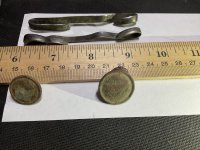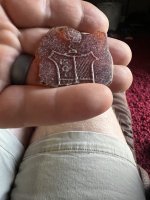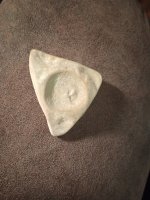DeepseekerADS
Gold Member
- Mar 3, 2013
- 14,880
- 21,725
- Detector(s) used
- CTX, Excal II, EQ800, Fisher 1260X, Tesoro Royal Sabre, Tejon, Garrett ADSIII, Carrot, Stealth 920iX, Keene A52
- Primary Interest:
- Other
15 Survival Uses For Salt | The Family Survival Club
Jason Richards
Salt is very useful to have with you at all times. Let’s see exactly why salt can help you even in the most unusual situations that you may have never thought of.
1. Relieving pain
Whether your family or yourself have been bitten by lice or ticks or stung by bees, you should rub a bit of salt on that side of the skin that has been aggressed. Similarly, you can mix water with salt and use the mixture to gargle. Do this at least three times a day if you have a sore throat. Water and salt (aka brine) is an excellent antiseptic, which you can also apply on wounds or cuts to prevent infections from developing.
2. Making herbicide
Never mind using herbicides pumped with chemicals. Whenever you wish to get rid of the poisonous plants around, throw a bit of salt directly on the ground, near the root of the plant and add water to it, to make sure the salt travels faster and starts killing the plant from the inside.
3. Making toothpaste
In survival situations, your regular commercial toothpaste will become a luxury toiletry. However, you can create your own by mixing a bit of salt with some baking soda (1:2 ratio). Do not apply too much pressure when brushing though, as you risk hurting your gums (i.e., salt and baking soda are quite abrasive).
4. Repelling ants
Out in the wild, having to deal with ants may prove a recurrent issue and let’s face it, quite irritating as well. You can easily get rid of ants and prevent further invasions, by just spreading a thin line of salt near the entry points of your home or tent. You can rest assured that ants will not get passed that line.
5. Preserving meat
The meat will last for much longer. First off, salt eliminates the water out of the meat, therefore it helps alienate an environment suitable for bacteria to grow and develop. In ancient times, people used to preserve meat, by rubbing it with salt and let it sit in a cool, dry place.
6. Cleaning off fish scales and pinfeathers
Fish scales will come off much easier and faster if you submerse the fish for a few seconds in brine. This is particularly useful if you do not have a good, sharpened knife on you.
Did you know that if rubbing a chicken with salt, the pinfeathers will come off very easy and you can save yourself a lot of time and avoid all that minuteness?
Similarly, if you are boiling eggs in brine, then the shell will come off in less than a few seconds.
7. Adjusting small fires
If you are making a bonfire to heat up or are in the process of making a barbeque and somehow you notice that the flames tend to extend, then throw a bit of salt in the fire. It will help you adjust the intensity and prevent a further expansion of the flames.
8. Acting as an anti-diuretic
A combination of water, salt and sugar will help you in difficult situations, as it will help restore the normal level of electrolytes in your body.
9. Speeding up the boiling process
If you add a bit of salt in the water, it will boil faster and help you save time in the process.
10. Removing rust
Removing the rust off your gun, knife or any other item or device that employs the use of steel should be one of your main concerns in the wild, as it can and will help you stay alive and even prepare and cook food. Combine lemon juice and salt (3:1 ratio) and rub off that rust.
11. Cleaning up your pets and eliminating bad odours
Did you know that if rub a bit of salt into your pets’ fur, then you will help them get rid of filth and ticks. They will lose the bad smell, too.
12. Cleaning your dishes
Creating your own dish detergent based on water and salt will thoroughly disinfect the plates, cutlery glasses and even the sponges that you use for cleaning.
13. Eliminating starch
Placing the peeled potatoes in water mixed with starch will remove the starch out of the tubers. Starch is bad because it contains glucose, a substance that can help you gain weight fast.
14. Testing the eggs
There is a simple way through you can test if the egg is edible or has gone bad. Immerse it in 200ml of water in which you have previously added three tablespoons of salt. If the egg floats, then it has gone bad. If it floats, then you can safely consume it. you can be sure it has gone bad.
15. Averting mould
Usually, if you keep your cheese in a fridge or a dug hole covered in ash for safekeeping, you will see that mould will begin to spread on your cheese. To avoid this from happening, simple cover the cheese with a piece of cloth soaked in brine.
Jason Richards
Salt is very useful to have with you at all times. Let’s see exactly why salt can help you even in the most unusual situations that you may have never thought of.
1. Relieving pain
Whether your family or yourself have been bitten by lice or ticks or stung by bees, you should rub a bit of salt on that side of the skin that has been aggressed. Similarly, you can mix water with salt and use the mixture to gargle. Do this at least three times a day if you have a sore throat. Water and salt (aka brine) is an excellent antiseptic, which you can also apply on wounds or cuts to prevent infections from developing.
2. Making herbicide
Never mind using herbicides pumped with chemicals. Whenever you wish to get rid of the poisonous plants around, throw a bit of salt directly on the ground, near the root of the plant and add water to it, to make sure the salt travels faster and starts killing the plant from the inside.
3. Making toothpaste
In survival situations, your regular commercial toothpaste will become a luxury toiletry. However, you can create your own by mixing a bit of salt with some baking soda (1:2 ratio). Do not apply too much pressure when brushing though, as you risk hurting your gums (i.e., salt and baking soda are quite abrasive).
4. Repelling ants
Out in the wild, having to deal with ants may prove a recurrent issue and let’s face it, quite irritating as well. You can easily get rid of ants and prevent further invasions, by just spreading a thin line of salt near the entry points of your home or tent. You can rest assured that ants will not get passed that line.
5. Preserving meat
The meat will last for much longer. First off, salt eliminates the water out of the meat, therefore it helps alienate an environment suitable for bacteria to grow and develop. In ancient times, people used to preserve meat, by rubbing it with salt and let it sit in a cool, dry place.
6. Cleaning off fish scales and pinfeathers
Fish scales will come off much easier and faster if you submerse the fish for a few seconds in brine. This is particularly useful if you do not have a good, sharpened knife on you.
Did you know that if rubbing a chicken with salt, the pinfeathers will come off very easy and you can save yourself a lot of time and avoid all that minuteness?
Similarly, if you are boiling eggs in brine, then the shell will come off in less than a few seconds.
7. Adjusting small fires
If you are making a bonfire to heat up or are in the process of making a barbeque and somehow you notice that the flames tend to extend, then throw a bit of salt in the fire. It will help you adjust the intensity and prevent a further expansion of the flames.
8. Acting as an anti-diuretic
A combination of water, salt and sugar will help you in difficult situations, as it will help restore the normal level of electrolytes in your body.
9. Speeding up the boiling process
If you add a bit of salt in the water, it will boil faster and help you save time in the process.
10. Removing rust
Removing the rust off your gun, knife or any other item or device that employs the use of steel should be one of your main concerns in the wild, as it can and will help you stay alive and even prepare and cook food. Combine lemon juice and salt (3:1 ratio) and rub off that rust.
11. Cleaning up your pets and eliminating bad odours
Did you know that if rub a bit of salt into your pets’ fur, then you will help them get rid of filth and ticks. They will lose the bad smell, too.
12. Cleaning your dishes
Creating your own dish detergent based on water and salt will thoroughly disinfect the plates, cutlery glasses and even the sponges that you use for cleaning.
13. Eliminating starch
Placing the peeled potatoes in water mixed with starch will remove the starch out of the tubers. Starch is bad because it contains glucose, a substance that can help you gain weight fast.
14. Testing the eggs
There is a simple way through you can test if the egg is edible or has gone bad. Immerse it in 200ml of water in which you have previously added three tablespoons of salt. If the egg floats, then it has gone bad. If it floats, then you can safely consume it. you can be sure it has gone bad.
15. Averting mould
Usually, if you keep your cheese in a fridge or a dug hole covered in ash for safekeeping, you will see that mould will begin to spread on your cheese. To avoid this from happening, simple cover the cheese with a piece of cloth soaked in brine.





